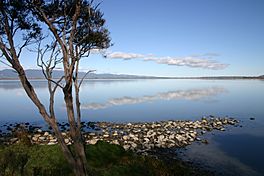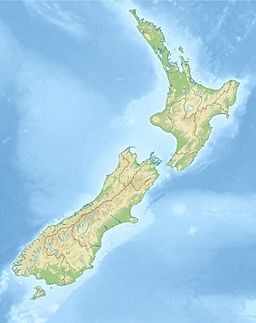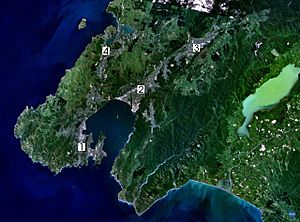Lake Wairarapa facts for kids
Quick facts for kids Lake Wairarapa |
|
|---|---|

Western shore looking South
|
|
| Location | South Wairarapa District, Wellington Region, North Island |
| Coordinates | 41°13′S 175°15′E / 41.217°S 175.250°E |
| Primary inflows | Ruamahanga |
| Primary outflows | Ruamahanga |
| Basin countries | New Zealand |
| Surface area | 78 km2 (30 sq mi) |
| Average depth | 2.5 m (8 ft 2 in) |
| Settlements | Featherston |
| Official name: Wairarapa Moana Wetland | |
| Designated: | 20 August 2020 |
| Reference #: | 2432 |
Lake Wairarapa is a large lake in New Zealand. It is found at the southern end of the North Island. This lake is about 50 kilometers east of Wellington. It is a special place with a rich history and important wildlife. The lake is part of the Wairarapa Moana Wetlands Park.
Contents
Discovering Lake Wairarapa
Where is Lake Wairarapa?
Lake Wairarapa is located in the South Wairarapa District. It is part of the Wellington Region on New Zealand's North Island. The town closest to the lake is Featherston. Featherston is just five kilometers from the lake's northern edge.
How Big is the Lake?
The lake covers an area of about 78 square kilometers. At its deepest point, it is about 2.5 meters deep. This makes Lake Wairarapa the third largest lake in the North Island. It is only a little bit smaller than Lake Rotorua.
Why the Lake Changed Size
The area that drains into the lake is very large. It includes the eastern slopes of the Remutaka Range and Tararua Range mountains. The lake used to get water from several rivers. It was also the main way for the Ruamahanga River to flow out.
This river slowly drained into Palliser Bay and Cook Strait. This happened about ten kilometers south, near a place called Lake Ferry. But in the 1960s, the river was moved. This helped reduce flooding for farmers. Because of this change, the lake is now much smaller. It used to be around 210 square kilometers.
Protecting the Wetlands
The land around Lake Wairarapa is low and swampy. These areas are called wetlands. They are very important for nature. Recently, people have worked hard to protect these wetlands. They want to bring back the wildlife habitat. This habitat was damaged by human activities over time.
Farming and river changes have drained large parts of the wetlands. This has reduced their natural value. Efforts are now being made to restore these special areas.
What About Pollution?
Lake Wairarapa is currently classified as "supertrophic". This means it has too many nutrients, like nitrates. These nutrients often come from farming around the lake. This issue is part of a bigger problem in New Zealand. Many rivers and lakes are affected by pollution from agriculture.
A Special Place for Māori
The lake has been important to Māori people for a long time. They used it as a source of food. Many types of waterfowl (birds that live on water) and fish live in or around the lake. Some of these species are rare in other parts of New Zealand.
 | Dorothy Vaughan |
 | Charles Henry Turner |
 | Hildrus Poindexter |
 | Henry Cecil McBay |



